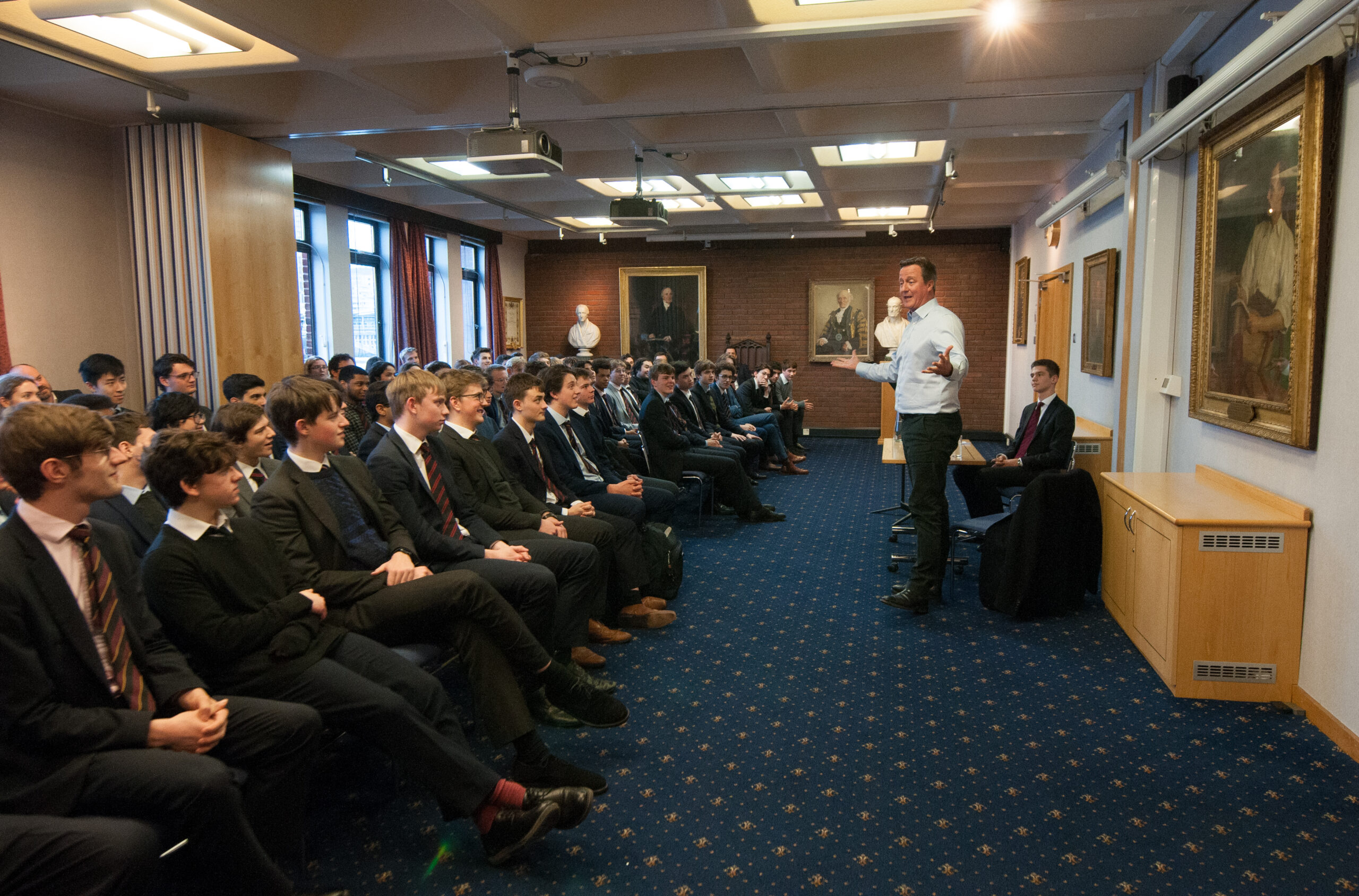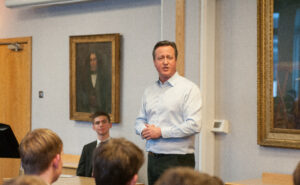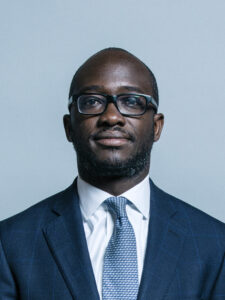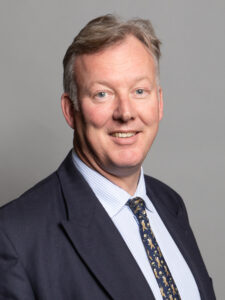 BBC News
BBC NewsBorrowing was £17.4bn last month, the second highest October figure since monthly records began in 1993.

Robert Golding reports on David Cameron’s post-premiership and what it can teach us about the meaning of success
It’s not quite clear if David Cameron is taller than you might expect, or whether you’ve given him extra height just by paying him more attention. It is as if fame has its own laws of perspective.
But the word ‘fame’ doesn’t quite encompass the experience of conversing with a former prime minister. In the first place, power is a very specific subset of fame. A David Cameron or a Tony Blair didn’t rise to our notice through artistic popularity or some kind of scientific or commercial ingenuity. In fact, if we are being mindful of our democratic inheritance, we might feel a certain sense of ownership over the likes of Cameron: after all, we put him there.
That fact makes us feel all sorts of thing we don’t necessarily feel with, say Elton John or Timothy Berners-Lee. It is possible – perhaps it is even quite likely – for a UK prime minister to achieve considerable sway over our lives and at the same time for him not to have done a single thing we cherish. Even Cameron’s achievements – with the possible exception of civil partnerships – aren’t necessarily loved.
But it’s the quirk of democracies that you often find that British people reserve their right to moan about a prime minister behind their back but to be in awe of them when in their company. A prime minister is therefore the recipient of mixed messages which might amount almost to gaslighting: respect and ridicule dovetail through their lives upon assuming the position, and the oddity of it all won’t let up once they’ve left office. It takes a death to exit the weirdness of Cameron’s level of fame.
We caught up with Cameron at a Grapevine event in Oxfordshire where Cameron was discussing his post-premiership priority – Alzheimer’s Research – with Lord Finkelstein. So whatever made him think he’d be a good prime minister? “Very good question. I was elected in 2001. From 1997 to 2000 we’d made virtually no progress at all. We were just in a terrible position. And so I think everyone was asking themselves, what is it the Conservative Party and what does it need to do? I took the more radical end of things and said, ‘Well actually, we’ve got to change a hell of a lot of things’. And the more I looked at the other people who were putting themselves forward, I didn’t think any of them were radical enough in saying what needed to change.”
What he means by this is really cultural change – a shift in the party’s attitude to gay marriage would lead to the Civil Partnerships Act 2004, and Cameron notes that his ‘hug a huskie’ stance on the environment continues to resonate today. “It’s fantastic that we have had COP 26 in Glasgow, and a Conservative Prime Minister who’s seen as one of the world leaders on the environment. That’s a great thing, and it’s because the Conservative Party decided it was a proper topic for us.”
As I listen to Cameron speak, I find myself thinking of the sheer strangeness of the role of prime minister – and then the even greater oddity of being a retired prime minister. The role itself – recently described by Sir Anthony Seldon as The Impossible Office – is unique. Let us toss partisanship to one side for one moment and admit that you have to be intelligent to secure the role in the first place. Once you have done that, an unusual array of interesting experience and information comes your way and you have to develop ways to sift and sort that information.
To hear Cameron talk is not just to be reminded of Tony Blair – as has always been the case, sometimes to the distress of people who would suspect Cameron of not being a true Conservative – but of Gordon Brown and Theresa May too. It’s a sense that they know how the world works and this lends their opinion on anything unusual credence – more so than a former Cabinet minister, or even than a former permanent secretary.
Members of the Royal Family meanwhile, though they might develop lengthier experience at the top, may experience a shielded version of reality which keeps from them the real difficulties which lie at the base of decision-making. Prime ministers are the people who have climbed, in Disraeli’s words, ‘to the top the greasy pole’. Princes – for all the respect they sometimes engender – are merely placed in palaces.
So what sort of skills does a prime minister develop – and how can they be deployed to solve problems once the individual has left Downing Street? Cameron is thoughtful in his reply: “I would say the first is the experience you gain in chairing a Cabinet, when you have quite a lot of people who support you and quite a lot of people who don’t support you, and you’re trying to corral people in the same direction – that is a useful skill.”
These skills, developed at the highest level, are, one suspects, somewhat wasted in chairing the comparatively small operation of a private office once one departs. But Cameron has done much more than that, and is throwing himself particularly now into his role as President of Alzheimer’s Research UK.
Cameron continues: “Furthermore, all the connections that you make, in terms of life sciences, business, philanthropy make a difference. We’ve got Bill Gates now involved in the fight against Alzheimer’s: he’s funding the early detection project. His father had Alzheimer’s, and he’s bringing billions to play into it. So I think all those things bring people together.”

David Cameron, former Prime Minister of the United Kingdom, speaking at City of London Schoo.. 13.2.2020 Photographer Sam Pearce / www.square-image.co.uk
Cameron adds that as Prime Minister, you get used to figuring out ways to actually get things done: “Now, I’m not a scientist myself: I was forbidden from doing physics and chemistry because I wasn’t good enough. But one of the reasons I got interested in this was because when I was in government, I got my science team around the table and asked them what were the most promising avenues for a big breakthrough in terms of science. They pointed me to the 100,000 Genomes Project, which has been hugely important in cracking Covid-19. They also pointed me towards Alzheimer’s because of the costs of the disease on the UK economy. Those sorts of skills – money raising, bashing heads together, getting things done – all help.”
Whatever you think of Cameron’s premiership, or his decision to grant the European referendum which made that premiership unravel with such dramatic swiftness in 2016, this is plainly a formidable set of skills.
And it turns out I’m not the only one to think they’re not being put to good use. Sam Gyimah held a range of ministerial posts under Cameron, and remains close to the former prime minister. He laments this sense that departing prime ministers are, in effect, put out to pasture: “Very few people have that unique experience and perspective but we don’t use them properly once they leave office,” he tells me.

I remind Gyimah of Bill Clinton’s lament that he felt he was leaving just as he had learned how to do the job. Blair, after 10 years, sometimes gave the same impression. But Gyimah, who now works in the corporate sector in many roles including as a non-executive director at Goldman Sachs International, is philosophical. “My life now is all about turning ideas into reality and I particularly like ideas where there’s a positive social impact. It’s not politics – but some of the things which attracted me to politics still apply. It’s just that I’m dealing with an investment response instead of a government response to problems. If you can unlock capital at scale then it can do wonderful things.”
So there is life after politics – but still, the life after politics for a prime minister can seem strangely limited and truncated. Surrounded by their security teams, with just the past for company, they must sometimes feel a strange mixture of solitude and frustrated irrelevance. It reminds me of a story once told to me by the photographer Graham Flack who remembers going to photograph David Cameron in respect of the famous writing-shed Cameron had installed in his garden at his Oxfordshire home. He and the journalist in question were early and waited for a while in a layby down the road from Cameron’s residence. When they arrived, they mentioned this to Cameron’s protection unit who replied: “Yes, we know, we were watching you.” The photograph itself had to be shot and reshot because one particular tree made the team worry that a viewer of the photograph would be able to locate Cameron’s house.
It doesn’t sound like much of a life – and yet perhaps these limits are a small hardship for the enormous privilege of having been caught up in history. During the on-stage Q&A, Finkelstein asks Cameron whether being Prime Minister has altered his perspective on great historical figures? Cameron relishes the question: “I think it makes you realise how the little decisions you’re making aren’t black and white. It’s not presented every day as “Here’s an important issue Prime Minister, but here’s the right decision and here are two wrong decisions. When are you going to make the right decision?” Cameron continues: “Many of the decisions you make are degrees of bad, and you’re trying to avoid the worst – and some of them you will get wrong. I think you do feel a greater sympathy for people who make the wrong decisions. What that does is give an enormous respect for those prime ministers who have the very biggest decisions to make. When you think of what Churchill did in May 1940, specifically the decision to fight on against Hitler, you’re more aware of the enormity of those really big decisions. Today, we’ll look back and think: “Well, of course we should do that”. But at the time, Churchill was surrounded by people saying, “No, we’ll get destroyed, the British Empire will be lost, we’ll never hold out.””
And yet those people who make the really big choices nowadays leave office with plenty to offer – and yet there seems to be little by way of structure once they do depart. Is the UK missing an opportunity here? Might it be that we should have some kind of Council of Elders, consisting of former prime ministers who might advise the sitting prime minister, as a sort of version of the weekly audience with the Queen?
When Cameron is asked about those weekly meetings with the Queen he is effusive: “One of the best things was going to see the Queen. It was an enormous treat, because you’re literally spending an hour with the world’s greatest public servant. I remember when I was at Eton, the Queen used to come to the carol service. The first year she came, I read the lesson. I got to the podium and forgot to say: “Thanks be to God at the end”. I looked at the podium and at the Queen and said: “Oh shit.” So I had the unique position 30 years’ later to ask the Queen: “Do you remember me saying that?” While I can’t reveal any of that conversation, my head stayed on my shoulders.”
One can easily imagine regular contact with previous prime ministers having a similar effect: surely it is salutary to have contact with your predecessors, as both a source of empathy, but also as a sort of memento mori, that your time in the spotlight shall recede swifter than you expect?
So has Cameron been back since? “Not very often. But we did have a very entertaining dinner for the 2001 intake, where Sir Bill Wiggin and I tripped off to London. It’s interesting going around the office and seeing people who worked with me and people I remember from around the building. And actually the mood was good. You felt like there was someone in the job who really enjoys it – but there’s no point in doing the job if you can’t relish the challenges.”
Cameron also remembers the humour of the job: “I had Nicolas Sarkozy in – actually the first person who visited me at 10 Downing Street. And obviously he brought his beautiful wife Carla Bruni. I remember this particularly well, because my private secretary was with me as they were driving up Downing Street. I said to my private secretary: “I shake his hand. Do I kiss Carla?” He said: “Yes, I think you should kiss Carla, she’s French.” I said: “How many times should I kiss Carla?” My private secretary: “As many times as you can get away with!”
Amused by this, I decide to catch up with Sir Bill Wiggin and ask him about his friendship with Cameron, and what the proper place is for a prime minister after their premiership is over.
“They should all go to the House of Lords,” Wiggin says, without missing a beat. “That is the right place for them and this trend to not go there is really worrying.”
Wiggin also points to the uniqueness of prime ministers: “They’ve all held the nuclear codes. When they talk about nuclear weapons, they’ve thought about it really hard. These guys have a hideous responsibility. They also get exposed to huge amounts of information from the best experts.”

So what’s the history of this? Wiggin explains: “If you’ve been Prime Minister, you are entitled to an earldom, and Clement Atlee was the last to take it. I’d like to see that change.”
Wiggin – who recently received his own knighthood – also links the case of Cameron and others to a wider need for House of Lords reform: “The House of Lords is really important, and we currently have the wrong people in there. We need to stop placing Olympic champions in the Upper Chamber. If you’ve won a gold medal, you’ve already been rewarded and it makes the honours system superfluous. Our system should focus on public service and delivery.”
Of course, there is other provision in place. According to the Public Service Act 2013, a former prime minister is entitled to an annual pension ‘equal to one half of their final salary when they left that office, regardless of age or length of service.’ Cameron actually waived this upon departure from office in 2016, unlike Tony Blair who didn’t.
Of course, this decision – gallant as it appeared at the time – didn’t necessarily end well, as all those who followed the Greensill Capital affair know. This episode, which for many has tarnished Cameron’s legacy, is symptomatic of a broader problem: there is still an abiding sense that prime ministers don’t know what to do with themselves. In fact, the happiest of the living former prime ministers seems to be Theresa May, who retains the parliamentary structures of life by remaining an MP – a job she is manifestly good at.
Is there anything to be learned from the American system? In the first place you have the great fandango surrounding presidential libraries which appears to keep former presidents busy, while also regenerating an area economically. Likewise, the big bucks memoir – though it probably has a Churchillian origin – has a sort of American tint to it these days. Cameron’s For the Record is rather a good one, and better than either Brown’s or Blair’s. May’s we still await.
But there is also another abiding image of former presidents gathering together for photo ops to work on cross-party hurricane relief for the good of the country. This occurred during the Hurricane Katrina in 2006 when the world was informed of the friendship between Bill Clinton and George H.W. Bush.
Is this something the UK should emulate? If Cameron were to be given some kind of government Alzheimer’s portfolio only the most timorous betting man would think he would be unable to achieve results. Cameron explains the problem: “Dementia is caused by diseases of the brain of which Alzheimer’s is the most significant. Just as we’re cracking diseases like cancer or heart disease, we should be focusing on this. When I was premier, I became more and more convinced that this was an area that needed proper government attention for scientific tests, for more research. It was way behind cancer research, so that became quite a priority of mine as prime minister.”
Cameron’s role now as President of Alzheimer’s Research UK includes raising money for the organisation as well as chairing the Board of our Early Detection of Neurodegenerative Diseases Initiative, an ambitious project which seeks to develop a digital tool to help detect the diseases that cause dementia years before the symptoms start.
Even so, Cameron still remembers his time in Number 10 fondly: “One of the great things about being Prime Minister is you can really put your shoulder to the wheel on some sort of slightly second order issue, and you can move things really quickly, really rapidly. The fact that a prime minister decides to make dementia a priority with the G8 really does make a big difference because the rest of the world goes “Oh well, we all want to think about that”.
And yet how frustrating to have had that power, to have achieved the knowledge of how to utilise it, and then, over an unrelated referendum to be deprived of the ability to solve those problems. Of course, this is democracy, but it still feels as though an opportunity is being missed somehow.
So what did Cameron most learn while in Number 10? “When you think of Number 10 you think it must be this enormous power. Actually, I think the greatest surprise about it is not how much power you have – but how little.” How so? Cameron explains: “The other departments you’re dealing with are ten times the size of 10 Downing Street, and they often quite literally don’t do what they’re told. Anyone in business reading this will be familiar with the idea that your finance manager didn’t respond to your command, and that does regularly happen. As a tiny example, I wanted to empty our prisons of Jamaican offenders by using a budget to build a prison in Jamaica. It was agreed we were going to do it, and spend the money. Six months later, I asked “How’s my Jamaican prison?” Literally nothing had happened. So you have to remember that in Number 10 you lead by building a team and making it work with you and for you.”
And, of course, we all need to do that. Prime ministers are unique in having been placed so severely under the microscope. But they teach us about human flaw and potential in equal measure. In particular, studying the lives of former prime ministers has something to tell us all about what we really want, and what success ultimately means for each of us.